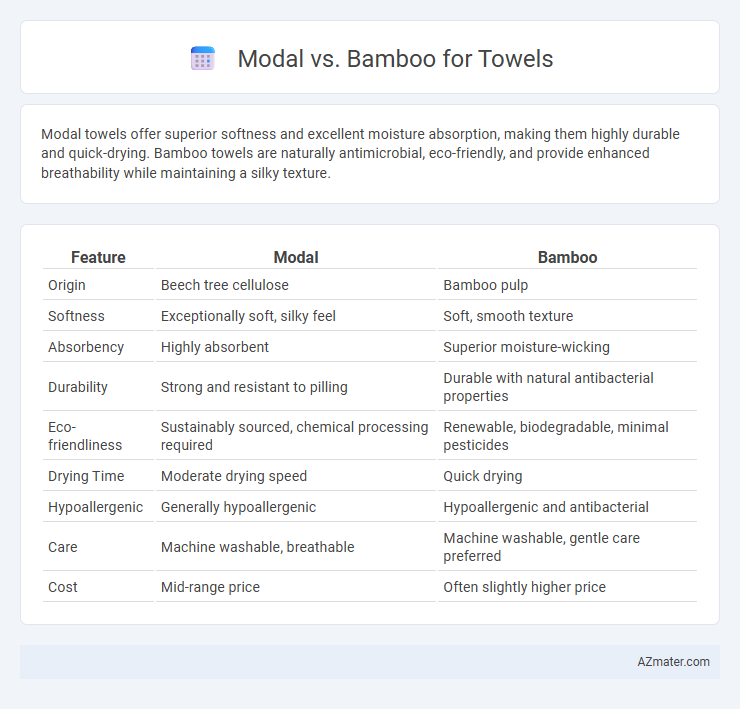Modal towels offer superior softness and excellent moisture absorption, making them highly durable and quick-drying. Bamboo towels are naturally antimicrobial, eco-friendly, and provide enhanced breathability while maintaining a silky texture.
Table of Comparison
| Feature | Modal | Bamboo |
|---|---|---|
| Origin | Beech tree cellulose | Bamboo pulp |
| Softness | Exceptionally soft, silky feel | Soft, smooth texture |
| Absorbency | Highly absorbent | Superior moisture-wicking |
| Durability | Strong and resistant to pilling | Durable with natural antibacterial properties |
| Eco-friendliness | Sustainably sourced, chemical processing required | Renewable, biodegradable, minimal pesticides |
| Drying Time | Moderate drying speed | Quick drying |
| Hypoallergenic | Generally hypoallergenic | Hypoallergenic and antibacterial |
| Care | Machine washable, breathable | Machine washable, gentle care preferred |
| Cost | Mid-range price | Often slightly higher price |
Introduction to Modal and Bamboo Towels
Modal towels are crafted from beech tree fibers, known for their exceptional softness, durability, and absorbency, making them a premium choice for luxury bathroom textiles. Bamboo towels are made from bamboo pulp, valued for its natural antibacterial properties, eco-friendliness, and excellent moisture-wicking abilities. Both Modal and bamboo towels offer sustainable alternatives to traditional cotton, combining comfort with environmental benefits.
What is Modal?
Modal is a semi-synthetic fabric made from beech tree pulp, known for its exceptional softness and high moisture absorbency, making it ideal for towels. It offers superior breathability and durability compared to traditional cotton, retaining its shape and color even after multiple washes. Its eco-friendly production process and smooth texture provide a luxurious feel, enhancing the towel's comfort and longevity.
What is Bamboo?
Bamboo fabric, derived from the pulp of bamboo grass, is renowned for its natural antibacterial properties, moisture-wicking capabilities, and eco-friendly sustainability compared to traditional fibers. Unlike Modal, which is a semi-synthetic fiber made from beech wood, bamboo towels offer superior softness, breathability, and durability, making them ideal for sensitive skin. The bamboo cultivation process requires less water and no pesticides, positioning bamboo towels as an environmentally responsible choice in sustainable textile production.
Sustainability: Modal vs Bamboo
Modal towels are crafted from beech tree pulp, offering a sustainable alternative by utilizing renewable forestry resources with minimal chemical processing. Bamboo towels leverage fast-growing bamboo plants, known for their natural pest resistance and low water requirements, making them highly eco-friendly. Both materials support sustainable textile production, but bamboo's rapid growth cycle provides a quicker renewable source compared to the slower regeneration of beech trees used for modal.
Softness and Texture Comparison
Modal towels offer exceptional softness due to their cellulose fiber composition, which creates a smooth, silky texture that feels gentle on the skin. Bamboo towels are naturally soft with a plush, absorbent texture, enhanced by their antimicrobial properties and moisture-wicking abilities. Comparing the two, modal towels tend to have a finer, more luxurious feel, while bamboo towels provide a thicker, cushier texture ideal for maximum comfort and durability.
Absorbency: Which is Better?
Modal towels exhibit superior absorbency compared to bamboo towels due to their fine, smooth fibers that hold more moisture efficiently. Bamboo towels also offer good absorbency but tend to dry slower because their fibers are less dense. For users prioritizing rapid and high moisture absorption, modal towels generally outperform bamboo variants in absorbency performance.
Durability and Lifespan
Modal towels offer exceptional durability due to their strong, fine fibers that resist pilling and maintain softness over time, resulting in a longer lifespan compared to traditional cotton towels. Bamboo towels are naturally antimicrobial and moisture-wicking, which helps reduce odor and bacterial buildup, contributing to extended usability and freshness. Both fibers provide durable, long-lasting towels, but modal generally withstands frequent washing better without losing its structural integrity.
Eco-friendliness and Environmental Impact
Modal towels, made from beech tree pulp, offer a biodegradable and renewable fiber option with a relatively low water footprint during production, making them eco-friendly. Bamboo towels, derived from bamboo grass, are highly sustainable due to bamboo's rapid growth rate and natural pest resistance, though chemical processing can impact their environmental rating. Both Modal and Bamboo towels provide eco-conscious alternatives to traditional cotton, with bamboo often favored for its fast renewability and Modal valued for its soft texture and biodegradability.
Cost and Value Analysis
Modal towels often come at a higher price point than bamboo towels due to the cost-intensive production process of beechwood fibers. Bamboo towels provide exceptional value with their natural antibacterial properties and durability, generally available at a more affordable price. Evaluating long-term value, bamboo's eco-friendliness and fast-drying features make it a cost-effective choice despite Modal's luxurious softness.
Choosing the Right Towel: Modal or Bamboo?
Modal towels offer exceptional softness, high absorbency, and durability due to their cellulose fiber composition derived from beech trees, making them ideal for sensitive skin. Bamboo towels boast natural antibacterial properties, excellent moisture-wicking abilities, and eco-friendly sustainability, perfect for those seeking a greener option. When choosing between Modal and Bamboo towels, consider factors like softness preference, skin sensitivity, environmental impact, and towel longevity to select the most suitable fabric for your needs.

Infographic: Modal vs Bamboo for Towel
 azmater.com
azmater.com